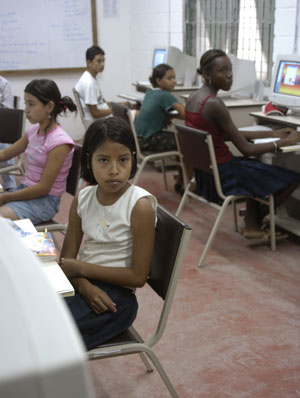 By Marla Pierson Lester
By Marla Pierson Lester
In a computer lab on the outskirts of San Pedro Sula, Honduras, elementary school students count to connect dots or answer simple math problems in an on-screen computer game – gaining valuable lessons in manipulating a keyboard and mouse as they practice math skills.
Mennonite Central Committee (MCC) worker Caleb Yoder guides older students in building documents in computer programs such as Microsoft Office, Excel or PowerPoint. High school students use the lab for internet research required for their classes or to type papers.
The lab, begun by the Honduran Mennonite organization MAMA, is in an area where most parents cannot afford to send their children to computer classes, much less have a computer in the home.
For many students, the lab provides their first opportunity to work on a computer.
“We have been able to see that the students, after they learn the programs, have been able to present better papers and improve their grades,†said Erlinda de Robelo, who has served as director of MAMA for the past 18 years.
Staff members have noted that becoming more proficient with computers can help boost students’ confidence and self-esteem, as well as provide needed job skills, de Robelo said. She noted that in this urban area, where youth may be susceptible to the lure of gang life, the lab along with MAMA’s other programs offers another path.
“It’s a great resource,†she said.
Yoder said computer classes are common supplements to students’ high school studies in Honduras, and the lab provides a low-cost alternative to more expensive classes offered elsewhere in San Pedro Sula. Classes cost roughly $1 a month at the MAMA lab; other courses, he has been told, may require tuition of more than $10.
In addition, children who are in MAMA’s center for special education use the computers to underscore the concepts of math and Spanish that they learn in school.
The computer lab started three years ago, and computers were purchased through grants from the Honduran government. It is available to students in the neighborhood and ties into MAMA’s projects aimed at preschool-age children, youth and students in a special education program.
When Nelson Geovany Guity began public school in San Pedro Sula, Honduras, he had tremendous difficulties pronouncing even simple words. As his academic problems grew, so did his shyness and timidity. Finally the teacher told his mother that it would be difficult for him to even finish elementary school.
But when he was placed in a special education program of Mennonite Central Committee (MCC) partner MAMA, Guity thrived.
Through the program, which allows for more intensive attention and focus on each student, he was able to learn to speak more clearly, overcome his shyness and return to a public middle school, where he continues to do well.
Today, between attending middle school classes and selling coconut bread to help support his family, the 16-year-old volunteers as a tutor in the center, helping younger students, and continues to attend computer classes. “To see him is a reminder that all the work we do at MAMA is truly worth it,†said MAMA director Erlinda de Robelo said.
De Robelo said teachers in public schools may have more than 50 students in a class. “When one student has special needs, it’s very, very diffcult for the teacher to be able to work with that student individually,†de Robelo said.
Guity said the assistance he’s gotten from MAMA has changed his life. Even though he still faces some challenges in speaking, “I have confidence in myself and that I am able to overcome any difficulty,” he said.
MCC, through its Global Family program, supports MAMA’s special education program, as well as its preschools and work with primary and secondary school students.
The opinions expressed in articles posted on Mosaic’s website are those of the author and may not reflect the official policy of Mosaic Conference. Mosaic is a large conference, crossing ethnicities, geographies, generations, theologies, and politics. Each person can only speak for themselves; no one can represent “the conference.” May God give us the grace to hear what the Spirit is speaking to us through people with whom we disagree and the humility and courage to love one another even when those disagreements can’t be bridged.
